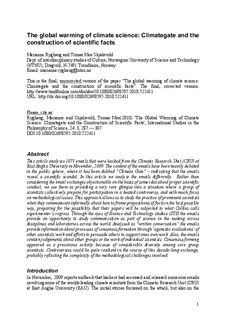| dc.contributor.author | Ryghaug, Marianne | |
| dc.contributor.author | Skjølsvold, Tomas Moe | |
| dc.date.accessioned | 2017-08-31T12:00:16Z | |
| dc.date.available | 2017-08-31T12:00:16Z | |
| dc.date.created | 2010-09-22T18:36:57Z | |
| dc.date.issued | 2010 | |
| dc.identifier.citation | International Studies in the Philosophy of Science. 2010, 24 (3), 287-307. | nb_NO |
| dc.identifier.issn | 0269-8595 | |
| dc.identifier.uri | http://hdl.handle.net/11250/2452589 | |
| dc.description.abstract | This article analyses 1,073 e-mails that were hacked from the Climatic Research Unit at the University of East Anglia in November 2009. The incident was popularly dubbed 'Climategate', indicating that the e-mails reveal a scientific scandal. Here we analyse them differently. Rather than objecting to the exchanges based on some idea about proper scientific conduct, we see them as a rare glimpse into a situation where scientists collectively prepare for participation in heated controversy, with much focus on methodology. This allows us to study how scientists communicate informally about framing propositions of facts in the best possible way. Through the eyes of science and technology studies, the e-mails provide an opportunity to study communication as part of science in the making across disciplines and laboratories. Analysed as 'written conversation' the e-mails provide information about processes of consensus formation through 'agonistic evaluations' of other scientists' work and persuasion of others to support one's own work. Also, the e-mails contain judgements about other groups and individual scientists. Consensus-forming appeared as a precarious activity. Controversies could be quite resilient in the course of this decade-long exchange, probably reflecting the complexity of the methodological challenges involved. | nb_NO |
| dc.language.iso | eng | nb_NO |
| dc.publisher | Taylor & Francis | nb_NO |
| dc.title | The Global Warming of Climate Science: Climategate and the Construction of Scientific Facts | nb_NO |
| dc.type | Journal article | nb_NO |
| dc.type | Peer reviewed | nb_NO |
| dc.description.version | submittedVersion | nb_NO |
| dc.source.pagenumber | 287-307 | nb_NO |
| dc.source.volume | 24 | nb_NO |
| dc.source.journal | International Studies in the Philosophy of Science | nb_NO |
| dc.source.issue | 3 | nb_NO |
| dc.identifier.doi | 10.1080/02698595.2010.522411 | |
| dc.identifier.cristin | 338375 | |
| dc.relation.project | Egen institusjon: 11 | nb_NO |
| dc.relation.project | Norges forskningsråd: 209697 | nb_NO |
| dc.description.localcode | This is a Manuscript of an article published by Taylor & Francis in International Studies in the Philosophy of Science on 06 Jan 2011, available online: http://www.tandfonline.com/doi/abs/10.1080/02698595.2010.522411 | nb_NO |
| cristin.unitcode | 194,62,40,0 | |
| cristin.unitname | Institutt for tverrfaglige kulturstudier | |
| cristin.ispublished | true | |
| cristin.fulltext | preprint | |
| cristin.qualitycode | 1 | |
